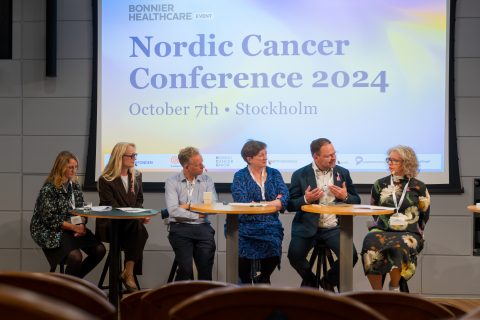This year marks the 75th anniversary of Nordic cancer collaboration, celebrated with a Nordic Cancer Conference held in Stockholm in partnership with Dagens Medisin. The conference brought together experts, policymakers, representatives from the cancer societies, and other key stakeholders from the Nordic countries to highlight the opportunities that Nordic cooperation presents in tackling one of the most pressing healthcare challenges of our time: cancer.
The Nordic countries share many similarities: relatively small populations, strong healthcare systems, and comprehensive health registries. However, they also face common challenges, such as an aging population, increased pressure on healthcare services, access to new medicines, participation in clinical trials, gaps in rehabilitation services, and social inequality. Individually, we are small, but together the Nordic region represents over 27 million people. The key message from the conference is clear – Collaboration is essential to overcome the challenges we face. By working together, we can learn from one another and draw inspiration. Areas where we can particularly benefit from future collaboration include prevention and clinical trials.
During the conference, we heard about numerous Nordic initiatives aimed at strengthening healthcare services and improving support for patients and their families. One such initiative is the Nordic University Hospital Alliance (NUHA), a new collaboration between the largest Nordic university hospitals. Leaders from these hospitals are working together to find solutions to future healthcare challenges, ultimately benefiting patients across the Nordic countries.
The European Health Data Space was another focal point at the conference. This regulatory initiative is designed to facilitate the secure exchange, use, and reuse of health data across the EU. Primarily, it enables citizens to access and share their health data electronically with healthcare providers across borders, making cross-border healthcare more efficient. Secondly, the data can be used for research and policymaking, ensuring privacy and security are maintained. The VALO project (Value from Nordic Health Data) is a Nordic initiative aimed at establishing shared principles for implementing the European Health Data Space regulations in the Nordic region, streamlining research, development, and innovation activities, and testing the use of health data across borders.
The Nordic countries are also actively involved in major European initiatives, as part of the Europe Beating Cancer Plan. Two notable examples are EUNetT-CCC (European Network of Comprehensive Cancer Centres) and JANE2. Both projects support cross-border collaboration to improve the quality and accessibility of cancer care.
As we celebrate 75 years of Nordic collaboration, the message is clear—by working together, we can continue to strengthen our ability to fight cancer and improve the lives of patients across the region.
